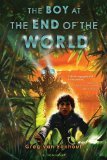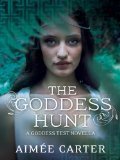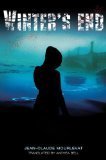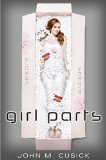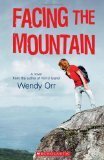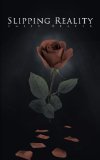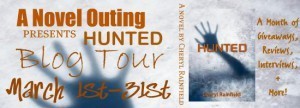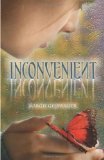Cheryl Rainfield's Blog, page 77
March 6, 2012
Cheap or on sale: children's and YA lit ebooks. Week of March 6, 2012
The Prometheus Project: Trapped by Douglas E Richards is $1.92
by Douglas E Richards is $1.92
From the New York Times and USA Today bestselling author of the adult thriller, WIRED, THE PROMETHEUS PROJECT: TRAPPED is the first book in a critically acclaimed science fiction series for kids.
A fantastic alien city buried deep underground. What wonders — and what dangers — is it hiding?
Ryan and Regan Resnick have just moved to the world's most boring place. But
when they discover their parents are part of an ultra-secret project called Prometheus they are plunged into a nonstop adventure: one that will be the ultimate test of their wit, courage, and determination. Soon they are under attack and facing hostile alien worlds, alien technology, and unimaginable dangers at every turn.
Now, with their mother facing certain death, they must race to solve a seemingly impossible mystery to have any hope of saving her. But if they save their mom, they will have no way to save themselves. . .
The Prometheus Project: Captured by Douglas E Richards is $1.92.
by Douglas E Richards is $1.92.
From the New York Times and USA Today bestselling author of the adult thriller, WIRED, THE PROMETHEUS PROJECT: CAPTURED is the second book in a critically acclaimed science fiction series for kids.
Ryan and Regan Resnick are the youngest members of a top-secret team exploring the greatest discovery ever made: a vast alien city buried deep underground – as potentially deadly as it is astonishing. When the city is captured by highly trained soldiers led by a ruthless alien, the adult members of the team are taken hostage. Now, Ryan and Regan are the team's only hope of survival.
With the future of the world at stake, the Resnick Kids must do the impossible: outwit the brilliant alien, free the prisoners, and thwart an unstoppable invasion. But not everything is as it seems. And time is quickly running out. . .
The Prometheus Project: Stranded by Douglas E Richards is $1.92
by Douglas E Richards is $1.92
The Boy at the End of the World by Greg Van Eekhout is $1.99 (Bloomsbury)
by Greg Van Eekhout is $1.99 (Bloomsbury)
This is what he knew:
His name was Fisher.
The world was dangerous.
And he was alone.
Fisher is the last boy on Earth – and things are not looking good for the human race. The carefully crafted survival dome where Fisher and dozens of other humans have been sleeping for millenia has been destroyed. Through a lucky accident, only Fisher survived.
The world Fisher wakes up in is a lot like ours – but it's changed, too. After the human race wiped itself out, nature took over, and wild creatures evolved into barely familiar beasts. Fisher must face them all as they set off on a journey that seems hopeless – at first. Then Fisher uncovers evidence that there may be a second survival dome far to the west. What was once a struggle for one boy's survival becomes a journey of hope.
With a broken robot and a friendly mammoth as his only companions, Fisher heads West. But something is watching them… something that wants to find the second survival dome just as badly as they do.
Mad Love by Suzanne Selfors is $1.99 (Walker Books)
by Suzanne Selfors is $1.99 (Walker Books)
When you're the daughter of a best-selling romance writer, life should be pretty good. But for 16-year-old Alice Amorous, daughter of the Queen of Romance, life is an agonizing lie. Her mother's been secretly hospitalized for mental illness, and Alice has been putting on a brave front, answering fan letters, forging her mother's signature, telling the publisher that all is well. But the next book is due and the Queen can't write it. Alice needs a story for her mother. And she needs one fast.
That's when she meets Errol, a strange boy who's been following her. A boy who tells her that he has a love story. A boy who believes he's Cupid. As Alice begins to hear Errol's voice in her head, and begins to see things she can't explain, she must face the truth – that she's either inherited her mother's madness, or Errol is for real.
The Goddess Hunt (Goddess Test) by Aimee Carter is $1.29 as a pre-order (Harlequin Teen)
by Aimee Carter is $1.29 as a pre-order (Harlequin Teen)
A vacation in Greece sounds like the perfect way for Kate Winters to spend her first sabbatical away from the Underworld…until she gets caught up in an immortal feud going back millennia. Castor and Pollux have been on the run from Zeus and Hades's wrath for centuries, hiding from the gods who hunt them. The last person they trust is Kate, the new Queen of the Underworld. Nevertheless, she is determined to help their cause. But when it comes to dealing with immortals, Kate still has a lot to learn….
A Goddess Test series ebook novella.
Winter's End by Jean-Claude Mourlevat is $3.49 (Candlewick)
by Jean-Claude Mourlevat is $3.49 (Candlewick)
Escape. Milena, Bartolomeo, Helen, and Milos have left their prison-like boarding schools far behind, but their futures remain in peril. Fleeing across icy mountains from a terrifying pack of dog-men sent to hunt them down, they are determined to take up the fight against the despotic government that murdered their parents years before. Only three will make it safely to the secret headquarters of the resistance movement, but the fourth is captured and forced to participate in a barbaric game for the amusement of the massesâ€"further proof of the government’s horrible brutality. Will the power of one voice be enough to rouse a people against a generation of cruelty? Translated from the French, this suspenseful story of courage, individualism, and freedom has resonated with young readers across the globe.
Girl Parts by John M Cusick is $2.99 (Candlewick)
by John M Cusick is $2.99 (Candlewick)
"Hello, David. My name is Rose. It's a pleasure to meet you. We are now entering minute two of our friendship. According to my Intimacy Clock, a handshake is now appropriate…"David and Charlie are opposites. David has a million friends, online and off. Charlie is a soulful outsider, off the grid completely. But neither feels close to anybody. When David's parents present him with a hot Companion bot to encourage healthy bonds and treat "dissociative disorder," he can't get enough of luscious red-headed Rose — and he can't get it soon. Companions come with strict intimacy protocols, and whenever he tries anything, David gets an electric shock. Severed from the boy she was built to love, Rose turns to Charlie, who finds he can open up, knowing Rose isn't real. With Charlie's help, the ideal "companion" is about to become her own best friend. In a stunning and hilarious debut, John Cusick takes rollicking aim at internet culture and our craving for meaningful connection in an uber-connected world.
March 5, 2012
Don't forget: 7pm chat on Twitter tonight with me & Margie Gelbwasser
REMINDER: Join us today at 7PM EST on TWITTER and #BreakSilence with YA authors Cheryl Rainfield and Margie Gelbwasser! Let's discuss the importance of realistic YA, and break the silence of abuse & bullying. There will be PRIZES! Hashtag: #BreakSilence
Check out my previous post for more info.
My radio interview with Dr Beth is live!
My radio interview with Dr. Beth is up! I hope you'll check it out. I talk about SCARS, self-harm and why I used it to cope, sexual abuse, and ritual abuse, and a tiny bit about HUNTED. If you pull the cursor to about 29 minutes in, you'll get my interview with Dr. Beth.
Guest Post by Children's & YA author Wendy Orr, & enter contest to win a copy of her new book
Today Wendy Orr, author of many beautifully written and powerful children's and YA books, including Nim's Island (with a strong-girl hero, a book that was so popular it was made into a movie starring Jodie Foster); Peeling the Onion (one of my personal favorites); Missing! A Cat Called Buster; and many others, is going to talk with us today about her newest book Facing the Mountain. Wendy is one of my favorite authors and people. Take it away, Wendy!
 A story's origins often start long, long before the idea that builds into a book. On the week that Facing the Mountain is released, I'm puzzling out where the story and characters came from.
A story's origins often start long, long before the idea that builds into a book. On the week that Facing the Mountain is released, I'm puzzling out where the story and characters came from.
Was it the summer I was eight and fell in love with the Rockies at Camp Kananaskis, in Alberta? Or when my family moved from Red Deer, to Colorado, and my dad, younger sister and I climbed Pikes Peak? Or sleeping out in the woods north of Lillooet, BC, and hearing that a grizzly had taken a camper the week before?
The truth is that too many threads go into one book to tease them all out. Some are simple and obvious: climbing a 4000m mountain, no matter how safe and near civilization, felt like a huge adventure and accomplishment. But it wasn't the pride I started with: it was the panic of the sudden breathlessness at about 3000m. I thought that would happen to the main character, Raven, too – but when I wrote it, it was the older sister, Lily, who hit the oxygen wall.
I also thought Raven would love the mountains as I did – but the more I wrote, the more I saw that she wasn't me, and she certainly didn't love mountains. How could she? Her mother has remarried: Raven has been uprooted from the only home she's ever known and the prairie town she's always lived in. The mountains, and especially the rockfall, are a symbol of everything that's changing in her life. Of course I didn't see the symbolism while I was writing; that comes later. I simply thought that she didn't like the claustrophobic feeling of trees and mountains, just like my Red Deer friend Gay, who spent two weeks with my family on Vancouver Island and loathed the closeness of the tall trees around the cabin. (In fact Raven's personality is very much drawn on Gay's, even though none of their story is the same. And her bossy story telling friend Jess… hmm, who could that be based on?)
But no matter who characters are based on initially, or what incident has sparked their book, the longer I write and rewrite, the more they become their own people and shape their stories themselves. That's the magic of writing, and why it's the greatest adventure of all.
To celebrate the release of Facing the Mountain, Scholastic Canada is giving away 5 copies on Goodreads.
About Facing the Mountain
A gripping adventure of wilderness survival from the author of Nim's Island.
Raven is over the moon when she is the first to get to the mountaintop on a trek with her sister and new stepfather. Reaching the summit is like standing on top of the world: exhilarating and breath-taking. But her triumph is short-lived when the earth starts shaking and she takes a terrible tumble down the side of the mountain. Terrified and injured, she stumbles around looking for her family, only to realize they are alive, but trapped in a cave, impossible to reach.
Raven sets out alone to find help. But with no food, and danger lurking at every turn, how will she find her way back to civilization?
In the tradition of Hatchet, Facing the Mountain is the captivating story of a young girl's incredible journey through unpredictable wilderness. Readers will be left breathless as Raven struggles to keep her wits about her and find the courage it takes to go on.
About Wendy Orr:
With a father in the RCAF, Wendy Orr grew up in various places in Alberta, BC, Ontario, and Nova Scotia, with spells in France and USA. She was a compulsive reader and writer from an early age, and now writes for children, young adults and adults. Her books have been published in 25 countries and languages and have won awards including the CBC (Australian) Book of the Year, American Library Association Book for older readers, and the Israeli March of Books. Wendy also worked on the screenplay that turned her book Nim's Island into a 2008 Hollywood feature film starring Jodie Foster, Abigail Breslin and Gerard Butler. The sequel, Nim at Sea, has also been optioned. Wendy is currently working on the Rainbow Street Shelter series for Henry Holt, USA.
March 2, 2012
Top 50 children's books according to Time Out NY. What are yours?
Time Out New Yorkhas named their top 50 children's books in celebration of Dr. Seuss' birthday. I love many of the books they've named (listed below). Check out the link above for the reasons they chose each book.
Some of my favorites are here, but I have many more I'd include. I wish their list was divided up by category. For picture books alone, I would add:
Tuesday by David Wiesner; A Sick Day for Amos McGee by Philip C Stead and Erin Stead; Tudley Didn't Know by John Himmelman; George Shrinks by William Joyce; Bread and Jam for Frances by Russel and Lillian Hoben; The Red Book (Caldecott Honor Book) by Barbara Lehman; Click, Clack, Moo: Cows That Type by Doreen Cronin and Betsy Lewin; Leonardo, the Terrible Monster by Mo Willems; Learning to Fly by Sebastian Meschenmoser; Hippo! No, Rhino by Jeff Newman; and many, many more.
Then middle-grade books would be a whole other list, as would YA. There are so many good children's and teen books!
What books would you add?
Time Out New York's Top 50 Children's Books
50. Amelia Lost by Candace Fleming
49. My Father's Dragon by Ruth Gannett Stiles, illustrated by Ruth Chrisman Gannett
48. Dave the Potter: Artist, Poet, Slave by Laban Carrick Hill, illustrated by Bryan Collier
47. Go Away, Big Green Monster! by Ed Emberley
46. Esperanza Rising by Pam Munoz Ryan
45. Doctor De Soto by William Steig
44. The Golden Compass by Philip Pullman
43. Mirror Mirror by Marilyn Singer, illustrated by Josee Masse
42. Little Bear by Else Holmelund Minarik, illustrated by Maurice Sendak
41. The Bone series by Jeff Smith
40. Are You My Mother? by P.D. Eastman
39. Mufaro's Beautiful Daughters by John Steptoe
38. Moonshot: The Flight of Apollo 11 by Brian Floca
37. Coraline by Neil Gaiman
36. Olivia by Ian Falconer
35. Number the Stars by Lois Lowry
34. The Paper Bag Princess by Robert Munsch
33. From the Mixed-Up Files of Mrs. Basil E. Frankweiler by E.L. Konigsburg
32. Caps for Sale by Esphyr Slobodkina
31. The Watsons Go to Birmingham—1963 by Christopher Paul Curtis
30. George and Martha by James Marshall
29. Tales of a Fourth Grade Nothing by Judy Blume
28. A Light in the Attic by Shel Silverstein
27. Lilly's Purple Plastic Purse by Kevin Henkes
26. Anna Hibiscus by Atinuke
25. The Invention of Hugo Cabret by Brian Selznick
24. Bark, George by Jules Feiffer
23. The Tale of Peter Rabbit by Beatrix Potter
22. Matilda by Roald Dahl
21. The Arrival by Shaun Tan
20. Chicka Chicka Boom Boom by Bill Martin Jr., illustrated by Lois Ehlert
19. Ramona the Pest by Beverly Cleary
18. Holes by Louis Sachar
17. The Complete Adventures of Curious George by H.A. Rey
16. The Phantom Tollbooth by Norton Juster
15. The Hobbit by J.R.R. Tolkien
14. Madeline by Ludwig Bemelmans
13. Charlie and the Chocolate Factory by Roald Dahl
12. Harriet the Spy by Louise Fitzhugh
11. The Secret Garden by Frances Hodgson Burnett
10. Knuffle Bunny by Mo Willems
9. The Lion, the Witch and the Wardrobe by C.S. Lewis
8. The Snowy Day by Ezra Jack Keats
7. A Wrinkle in Time by Madeleine L'Engle
6. The Cat in the Hat by Dr. Seuss
5. The Very Hungry Caterpillar by Eric Carle
4. Harry Potter and the Sorcerer's Stone by J.K. Rowling
3. Goodnight Moon by Margaret Wise Brown, illustrated by Clement Hurd
2. Charlotte's Web by E.B. White
1. Where the Wild Things Are by Maurice Sendak
Thoughtful interview of me by YA author Catherine Ryan Hyde
I hope you'll check out my interview that YA author Catherine Ryan Hyde did with me on SCARS being censored, self-harm, the word "queer", my reader letters, HUNTED, and more. She asked me some of the most thoughtful questions I've ever been asked. It was a pleasure to work with her!
March 1, 2012
Guest Post by YA author Emily Beaver: How to Write According To Emily Beaver
Today Emily Beaver, author of Slipping Reality , talks to us about how she writes. Take it away, Emily! How do you write?
, talks to us about how she writes. Take it away, Emily! How do you write?
How to Write According to Emily Beaver
I'm hardly the person to ask when it comes to this! I acknowledge that I am young and have a long way to go in terms of improving my technique and the quality of my writing, but I know that writing isn't what I love, its what I do, so I've just got to go with it!
I write to make a point. The first book I ever wrote (and will never, ever publish!) I wrote for my unofficial sister, Pilar, because I wanted to prove to her that there was no shame in falling in love. Is the message trite? Certainly. But I wanted to express it to her in a way that helped her situation, and by extension, my own as well. The same came about with Slipping Reality. I wrote it to prove something to myself – that there was no use in running away, and that if I was ever lost or alone, I always had my writing to take me back.
A lot of authors I follow and admire do outlines. I wish I could do that, but I prefer to keep a map of the story in my head. I always have a separate document for writing down all my brainstorms, ideas, along with all my character information. In my Slipping Reality brainstorm document I've got deleted scenes, the original working names for Tristan and Cedric, Katelyn's bell schedule, a list of last names, basic descriptions (eye color, etc.), plot ideas, musings, and on and on. It was good for getting the bad ideas out, fast – originally I had wanted Tristan and Cedric to exist in real life, too, but then I realized there was no way I could write that without making them extreme creepers, so that idea had to go, and by writing it out in that document I found my alternative – products of Katelyn's imagination solely.
I also write upcoming scenes. Usually I don't like to spoil myself by getting to write all the most exciting scenes first – because then I lost motivation to finish the book – but if I really get hit with inspiration and that scene is still a few chapters away, I'll write it out. Usually I have to change it here and there anyway to fit it in with the story, but other times it will fit just perfectly. In my first book, I had the ending written for months. With Slipping Reality, I had it only for a week. It all depends.
See, it makes logical sense to me to outline books. To have post-its or pin boards to plot out the story, but that just doesn't work for me. It's been said time and time again that everyone writes differently and I will say just the same, because it's true. I write my books in order with the occasional scene saved for later, some other authors jump around. Some people become their characters, I prefer to talk to mine. In the end, I think all writers share a portion of crazy, and I love it!
So, yeah, everyone's got their strategy. When I get writer's block I like to turn to my inspirations to get me back going; others prefer to keep writing anyway. But I like to think we all write to tell a story. My stories involve my heart, others involve their interests and curiosities. As long as there's a subject, and as long as there's passion, you've got a story. And that's how I write, whether it's good or not!
Emily Beaver wrote her first book at 14 years old as a tribute to her older brother and only sibling, Matthew, who passed away from cancer. A dedicated writer since the age of 8, she dreamed of publishing a novel in her teenage years, and it was her brother who gave her the courage and passion to do so. Slipping Reality released July 2011 and is a thinly veiled fictional story based on Emily's own experience dealing with the pain of her brother's battle with Ewing's Sarcoma, a rare form of bone cancer.
Emily is an AP Scholar and enjoying her senior year of high school. Her writing can be seen in Chicken Soup for the Soul: The Cancer Book, various magazines, and thisibelieve.org. She is also a regular contributor on SparkNotes.com, where a piece on her brother received an award for "Most Inspiring."
In addition to writing, Emily loves acting and singing – she recently led school productions of Fiddler on the Roof and Noises Off, and is in the audition-only Women's Ensemble as a section leader. She also enjoys public speaking, taking voice lessons, playing the piano and volunteering as a teacher of Hebrew and Judaica to third graders at Temple Adat Shalom. Emily is based in San Diego, but is happiest roaming Disneyland as often as possible.
HUNTED blog tour kicks off today
The HUNTED book blog tour starts today! You can read my opening post at A Novel Outing. Over a few weeks, you can read interviews with me, guest posts I wrote, reviews of HUNTED, and have the chance to win copies of HUNTED and SCARS. I hope you'll take part!
February 29, 2012
Q & A with Emily Beaver, author of Slipping Reality
You've been writing since you were 8 years old! I think that's one of the signs of being a writer! And you wrote Slipping Reality when you were just 14! Tell us how you came to write it.
when you were just 14! Tell us how you came to write it.
 I wrote Slipping Reality
I wrote Slipping Reality because of Matthew Beaver, my older brother and best friend. He is, in fact, part of the reason I began to love writing in the third grade. My teacher had assigned a fable and instead of the minimum paragraph most of my peers turned in, I wrote ten pages. Matthew read my class assignment and encouraged me to write more. From then on he read every single word I ever wrote. He was my built-in support system that I expected to have through my entire life.
because of Matthew Beaver, my older brother and best friend. He is, in fact, part of the reason I began to love writing in the third grade. My teacher had assigned a fable and instead of the minimum paragraph most of my peers turned in, I wrote ten pages. Matthew read my class assignment and encouraged me to write more. From then on he read every single word I ever wrote. He was my built-in support system that I expected to have through my entire life.
But Matthew was diagnosed with a rare bone cancer called Ewing's Sarcoma just three years later. He was fourteen – the same age I would be when I penned this book. He fought it for three and a half years. I was just six weeks into my freshman year at a completely new high school where I knew no one, when I learned that Matthew was going to die. Deep down, I knew the right thing to do would be to support him through that transition, regardless of the consequences to me but that didn't stop it from being so hard…
I didn't expect that the process of dying would make Matthew a different person from my brother. He was incoherent, weak and constantly drifting in and out of sleep. I didn't want to be around him but felt obligated because I knew I'd never see him again. I stopped going to school eventually, and I wouldn't leave the house because I didn't know when his time would come. And one day, as I was walking up the stairs after visiting him, I thought of how much I would love to escape to the only place I knew that could comfort me now – my imagination. Immediately I had the idea of a girl whose brother was dying of cancer, and how she ran away from this inevitable fact in her imagination. I ran to my computer, sat down, and typed two words – Slipping Reality .
.
So the book is based on your personal story?
The book is fictionalized truth. I did not run away to my imagination like my character, Katelyn Emerson, did. I did not hallucinate two guides; Katelyn did. Katelyn carries a lot of my qualities in looks, along with some of my flaws, but she also is an emphasis of the emotional instability I had at that time, so I could be weak through her. The story you're reading may reflect my own, but it is in no way my own. I lived my brother's final goodbye the right way. It's up to you to see how Katelyn lives hers.
For those who haven't read it yet, can you give us a quick summary of what Slipping Reality is about?
It's a story about 14-year-old Katelyn Emerson, who when faced with her brother's deteriorating condition, falls into her imagination to help her cope – with the consequence of fading further and further away from reality. It was the story I wanted to live, but the story I could only tell. In my real life, I had to deal with the pain of watching my brother pass, so I wrote what I wished could be.
Even though you had your own experiences to draw on for the book, did you still have to do some research?
I researched a lot on dream analysis, book classics (for Tristan's collection), Tuberculosis (which is what Diana originally died from), and hallucinations. I came at Katelyn's condition from many psychological perspectives, from Freudian to cognitive to even neurological, before I decided to use my pinch of fiction to explain her "visions." When she is too emotionally overwhelmed, her mind snaps, thus creating the hallucination. Simple as that. But before I could form that explanation, flimsy as it is, I went through a lot of research, on George Berkeley (and his Treatise Concerning the Principles of Human Knowledge) and Steppenwolf (later Tristan's favorite book). An ongoing inspiration was the poem "Confessions of a Bound Soul" by Amanda Saveley on poemhunter.com. She writes about her brother and I recall it striking a chord in me that propelled me to write her emotions, too.
How did your brother's battle with cancer affect your family? How did it affect you?
Prior to Matthew's diagnosis, my family was absolutely normal, the quintessential picture of a nuclear family, until our lives were turned upside down with this disease.
When Matthew was ill I heard a lot of people asking my parents if they were okay, asking me if my brother was okay, my parents, my grandparents, my aunt and uncle… but I never heard anyone ask if I was okay. People don't seem to take into consideration how much a sibling deals with during a tragedy, and as I one day found out in a grief-stricken search of the Internet, there's almost no research on sibling grief – and most of it is directed at adults who lose their brother or sister in a car crash, which goes to show how rare a case this is. From what research I've found, we're called "The Forgotten Mourners." I certainly felt that way. I do not at all intend to undermine the emotional stress on the parents, spouses, or the patient especially, but I remember how it felt to not be as important. Especially coming from the youngest child who was used to the majority of attention, it was rough.
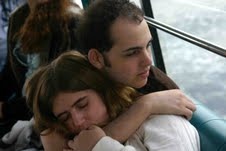
What are some things that would have been nice for people to say or do for you as you went through this painful experience? Do you have any advice for people going through something similar?
You know, it's not really what people say, but how they say it. I've received countless hugs from hearing about my situation, but I remember the ones that genuinely came from a place of depth and sympathy. The same goes for words of comfort – my favorite nurse who took care of my brother, Amy Schneider, once told me that it is the people and their intentions that stay with you, not what they have said.
I don't think I'm a good example of what to say when being confronted with a devastating situation. Truth be told, when the situation is reversed I, too, have difficulty finding the right words. It's not so much a question of character or how much that person cares about your situation – trust me, they do. Today our society makes it so difficult for people to admit something's wrong, which is something that deeply affected me during Matthew's treatment – how do you bring up something so significant to your life without scaring people off? Everyone just wants to be normal – for a while, I did too. So I think the best thing I can say is to the people in the situation themselves – be understanding. The beautiful thing about people in their right minds is that they all want to say the one thing that will bring you comfort. Look at that instead of what they actually say, because that's their intention.
Just hours before Matthew passed, you found out you were being published in the popular Chicken Soup for the Soul series. Was Matthew proud of you? How did the opportunity come about?
I don't know if he was proud of me – he was too weak to really understand any news that we had. The opportunity came about when my mother told me about how Chicken Soup was looking for stories for a cancer book, and asked if I wanted to write something and submit it. I was 13 years old and in a constant hurry, but I did, and by some miracle, it was published. I was thrilled, because I had early on in Matthew's cancer treatment begun obsessively reading Chicken Soup books, and because it was my first paid writing job. I don't think I'll ever forget the opportunities that came from being published in that book, and the amount of screaming I had to do when I opened the package that contained my first advanced copy.
David Tabatsky hailed Slipping Reality as a book that "proves adults are not the only authors capable of cutting so beautiflly to the bone of a story." How does it feel to get such high praise at the beginning of your writing career?
as a book that "proves adults are not the only authors capable of cutting so beautiflly to the bone of a story." How does it feel to get such high praise at the beginning of your writing career?
Ironically, I can't even tap into the proper words to describe how it feels, and I'm a bloody author. I absolutely adore David Tabatsky – he was my mentor and my coach through this process, and I'm throughly indebted to him for all his amazing insight. To receive such high praise in return was an unexpected gift that really helped me realize just how much David believed in me, and how important that was.
You have a full life ahead of you to share your stories. Do you plan to write more books?
The funny thing is, I never dreamed about publishing a book beyond my high school years. It was kind of like, "Okay, I'll publish a book, then what?" I admit I am working on a new book right now – though I hesitate to give its details – that I'm quite excited about. But who knows where my life will take me? Writing will always be a part of me because that's what keeps me living. But I have other passions and other dreams I hope to achieve, and I want my life to be an adventure. So let's just say – the future is open. I will never turn down the opportunity to write a book if the story comes to me, but I will never settle in to only writing books if I don't have a story to tell. Anything is possible!
Website
Twitter
Facebook: Slipping Reality
Memorial Video for Emily's brother, Matthew Beaver
February 27, 2012
Chat with YA authors Cheryl Rainfield and Margie Gelbwasser on Mon March 5th at 7pm EST on Twitter
Chat with me and YA author Margie Gelbwasser on Twitter on Monday, March 5th at 7pm, on YA books, the importance of talking about painful issues and breaking silence in YA books, and more. We'll be using the hashtag #BreakSilence, so if you use something like TweetChat it'll be easy to follow along. Ask us questions during the chat, or send your questions ahead of time to twitterchat @ jkscommunications (dot) com.
5 lucky #BreakSilence Twitter chat participants will win 1 of these 5 prizes:
PRIZES:
1 signed copy of PIECES OF YOU + signed bookmarks
2 signed copies of HUNTED (paperback Canadian version)
2 ebook review copies of HUNTED
Please help spread the word!
Tweet #BreakSilence
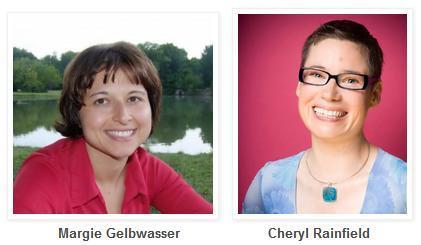
When Margie Gelbwasser wrote her first YA novel, INCONVENIENT (Flux, 2010), her dad said, "The writing is nice, but there are very few Jewish alcoholics." A Russian woman who read it said, "Yes, to Americans it may seem like the mom is an alcoholic, but she isn't really." And then there were those who thanked her for telling their story. Too much of real life is kept behind closed doors, with victims thinking their plight is the norm or that this only happens to them.
(Flux, 2010), her dad said, "The writing is nice, but there are very few Jewish alcoholics." A Russian woman who read it said, "Yes, to Americans it may seem like the mom is an alcoholic, but she isn't really." And then there were those who thanked her for telling their story. Too much of real life is kept behind closed doors, with victims thinking their plight is the norm or that this only happens to them. 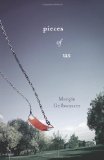
 website.
website.

